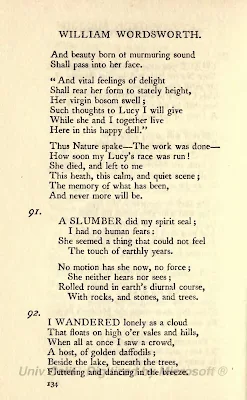Three Years She Grew in Sun and Shower - William Wordsworth | BOSEM Class 10 English Notes
Board of Secondary Education Manipur (BOSEM)
Class - XEnglish Literature Reader (Poetry)Chapter - 2
Three Years She Grew in Sun and Shower
William Wordsworth
Paraphrase
Lucy reached the age of three, experiencing both sunny days and rainy ones. At that moment, Nature proclaimed, "Never has the world nurtured a more beautiful flower than this child. I will nurture her and mould her into a lady according to my unique vision."
"I will provide my cherished daughter with both guidance and vitality. Under my nurturing, this girl—whether amidst rocky plains, on the ground or in the sky, in open spaces or beneath the trees—will embody the spirit of a guardian of the natural world, capable of igniting new endeavours or restraining them."
She will exhibit the same playfulness as a fawn leaping across the lawn or scaling a mountainside. Additionally, she will exude a serene, tranquil demeanour akin to that of inanimate objects in the world.
The passing clouds will bestow upon her their dignity, and the willow tree will provide her with a resting place. She will always be attuned to the grace present even in the fiercest storms, and this grace will quietly mould her character.
She will cherish the midnight stars and delight in the melodious dance of hidden streams. Her countenance will mirror the beauty of their harmonious sounds.
Vibrant, exuberant joy will contribute to her growth, bestowing upon her a graceful stature and a youthful form. I will instil these ideals in Lucy as we reside together in this enchanting valley.
Nature's words rang true, and its intentions were carried out as planned. However, Lucy's life was fleeting, for she departed, leaving me with nothing but this serene, tranquil meadow, and with my recollections of what once existed and will never return.
Summary: Lucy's Life and Nature's Proclamation
- Lucy reached the age of three, experiencing both sunny days and rainy ones.
- Nature proclaimed to nurture Lucy into a lady according to its unique vision.
- Nature promised to provide guidance and vitality to Lucy, shaping her into a guardian of the natural world.
- Lucy was to embody the spirit of the natural world, exhibiting playfulness and a serene demeanour.
- She would be attuned to the grace present in nature, cherishing the stars and delighting in the dance of hidden streams.
- Nature's intentions for Lucy were carried out as planned, but her life was fleeting, leaving behind memories of her existence and the serene, tranquil meadow.
Textbook Exercises
1. How is Nature personified in the poem?
Ans.: - The poem personifies Nature as a mother figure.
2. Write how Nature treats Lucy.
Ans.: - Nature treats Lucy as her own child.
3. In what way does Lucy enjoy the nights?
Ans.: - Lucy enjoys the night by gazing at the stars and tuning in to the gentle murmur of rivers.
4. 'The work was done' - what is 'the work' referred to?
Ans.: - The work in question involves the responsibility of educating Lucy by ensuring she experiences all the joys and pleasures in life.
1. What does the poet tell us about Lucy's education by Nature?
Ans.: - Nature has decided to take Lucy under her wing and transform her into a refined lady. Nature will shape Lucy's character and personality, guiding her to become an ideal and cultured woman. For Lucy, Nature will serve as both a guiding force and a spontaneous influence.
2. The poet compares Lucy to a fawn. How is the comparison apt?
Ans.: - The poet expresses the belief that Lucy will exhibit playful behaviour like a fawn and have the ability to run freely "across the lawn" with unbridled joy. Despite her physical limitations on earth, the poet envisions that in her new realm, she would revel in the freedom to run like a fawn and take pleasure in both "the silence and the clam".
3. Explain the expressions "overseeing power", "breathing balm" and "murmuring sound".
Ans.: - "Overseeing power" refers to a divine presence that will attentively watch over Lucy.
4. Describe the physical development of Lucy by different objects of Nature.





Comments
Post a Comment